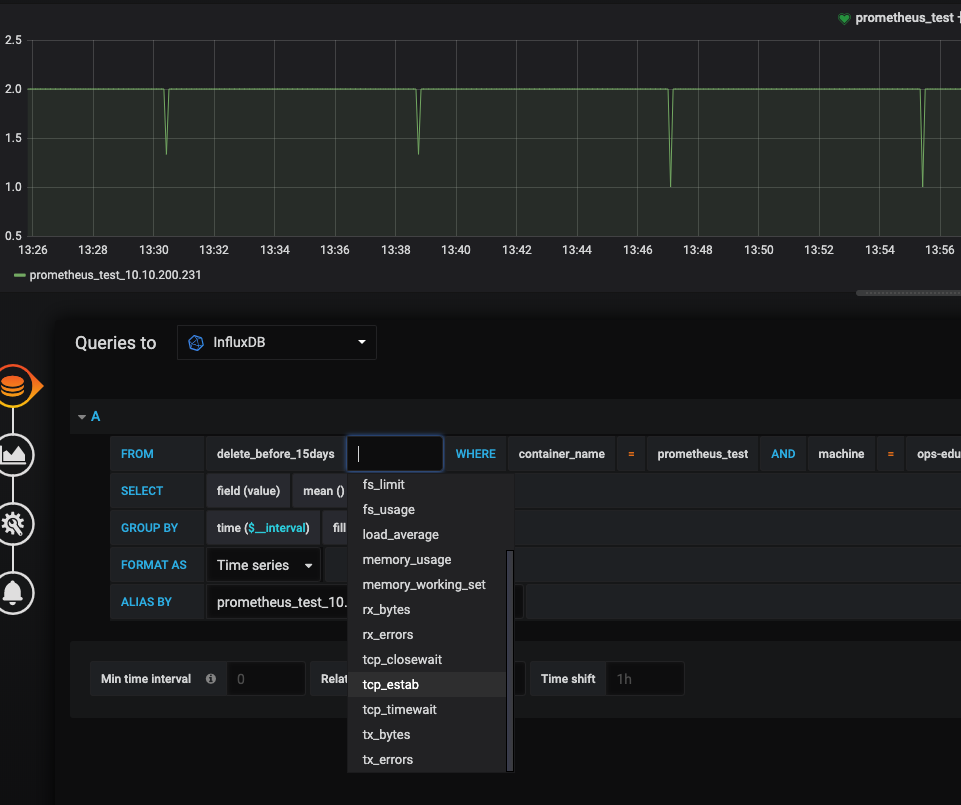1. Requirement description:
cadvisor+influxdb+grafana is used for container monitoring and data display, and tcpstats related data are collected.
Turn off the default disable-metric at startup. The startup parameters are as follows:
[program:cadvisor] command=/root/go/src/cadvisor/cadvisor -port=18080 -logtostderr=true -v=5 -enable_load_reader=true -storage_duration=15s -disable_metrics="" -docker_only=true -storage_driver=influxdb -storage_driver_db=influxdb -storage_driver_user=influxdb -storage_driver_password=influxdb -storage_driver_host="127.0.0.1:18086" numprocs=1 autostart=true autorestart=true startsecs=3 startretries=5 stopasgroup=true killasgroup=true stdout_logfile=/var/log/supervisor/cadvisor_out.log stderr_logfile=/var/log/supervisor/cadvisor_err.log
2. Problem Location
523823198@qq.com
After startup, it is found that there is no tcpstat related value in the data written to influxdb. so view the source code as follows:
cat storage/influxdb/influxdb.go
...
50 // Series names
51 const (
52 // Cumulative CPU usage
53 serCpuUsageTotal string = "cpu_usage_total"
54 serCpuUsageSystem string = "cpu_usage_system"
55 serCpuUsageUser string = "cpu_usage_user"
56 serCpuUsagePerCpu string = "cpu_usage_per_cpu"
57 // Smoothed average of number of runnable threads x 1000.
58 serLoadAverage string = "load_average"
59 // Memory Usage
60 serMemoryUsage string = "memory_usage"
61 // Working set size
62 serMemoryWorkingSet string = "memory_working_set"
63 // Cumulative count of bytes received.
64 serRxBytes string = "rx_bytes"
65 // Cumulative count of receive errors encountered.
66 serRxErrors string = "rx_errors"
67 // Cumulative count of bytes transmitted.
68 serTxBytes string = "tx_bytes"
69 // Cumulative count of transmit errors encountered.
70 serTxErrors string = "tx_errors"
71 // Filesystem device.
72 serFsDevice string = "fs_device"
73 // Filesystem limit.
74 serFsLimit string = "fs_limit"
75 // Filesystem usage.
76 serFsUsage string = "fs_usage"
77 )
...
...
180 func (self *influxdbStorage) containerStatsToPoints(
181 cInfo *info.ContainerInfo,
182 stats *info.ContainerStats,
183 ) (points []*influxdb.Point) {
184 // CPU usage: Total usage in nanoseconds
185 points = append(points, makePoint(serCpuUsageTotal, stats.Cpu.Usage.Total))
186
187 // CPU usage: Time spend in system space (in nanoseconds)
188 points = append(points, makePoint(serCpuUsageSystem, stats.Cpu.Usage.System))
189
190 // CPU usage: Time spent in user space (in nanoseconds)
191 points = append(points, makePoint(serCpuUsageUser, stats.Cpu.Usage.User))
192
193 // CPU usage per CPU
194 for i := 0; i < len(stats.Cpu.Usage.PerCpu); i++ {
195 point := makePoint(serCpuUsagePerCpu, stats.Cpu.Usage.PerCpu[i])
196 tags := map[string]string{"instance": fmt.Sprintf("%v", i)}
197 addTagsToPoint(point, tags)
198
199 points = append(points, point)
200 }
201
202 // Load Average
203 points = append(points, makePoint(serLoadAverage, stats.Cpu.LoadAverage))
204
205 // Memory Usage
206 points = append(points, makePoint(serMemoryUsage, stats.Memory.Usage))
207
208 // Working Set Size
209 points = append(points, makePoint(serMemoryWorkingSet, stats.Memory.WorkingSet))
210
211 // Network Stats
212 points = append(points, makePoint(serRxBytes, stats.Network.RxBytes))
213 points = append(points, makePoint(serRxErrors, stats.Network.RxErrors))
214 points = append(points, makePoint(serTxBytes, stats.Network.TxBytes))
215 points = append(points, makePoint(serTxErrors, stats.Network.TxErrors))
216 self.tagPoints(cInfo, stats, points)
217
218 return points
219 }
...The metric s of tcpstats are not collected in the source code into influxdb, so they need to be added manually.
3. Problem solving
Modify the original code and add the data you need to points.
vim storage/influxdb/influxdb.go
...
50 // Series names
51 const (
52 // Cumulative CPU usage
53 serCpuUsageTotal string = "cpu_usage_total"
54 serCpuUsageSystem string = "cpu_usage_system"
55 serCpuUsageUser string = "cpu_usage_user"
56 serCpuUsagePerCpu string = "cpu_usage_per_cpu"
57 // Smoothed average of number of runnable threads x 1000.
58 serLoadAverage string = "load_average"
59 // Memory Usage
60 serMemoryUsage string = "memory_usage"
61 // Working set size
62 serMemoryWorkingSet string = "memory_working_set"
63 // Cumulative count of bytes received.
64 serRxBytes string = "rx_bytes"
65 // Cumulative count of receive errors encountered.
66 serRxErrors string = "rx_errors"
67 // Cumulative count of bytes transmitted.
68 serTxBytes string = "tx_bytes"
69 // Cumulative count of transmit errors encountered.
70 serTxErrors string = "tx_errors"
71 // Filesystem device.
72 serFsDevice string = "fs_device"
73 // Filesystem limit.
74 serFsLimit string = "fs_limit"
75 // Filesystem usage.
76 serFsUsage string = "fs_usage"
77 // Tcp Establisd count.
78 serEsTabs string = "tcp_estab"
79 // Tcp TimeWait count.
80 serTimeWait string = "tcp_timewait"
81 // Tcp CloseWait count.
82 serCloseWait string = "tcp_closewait"
83 )
...
...
180 func (self *influxdbStorage) containerStatsToPoints(
181 cInfo *info.ContainerInfo,
182 stats *info.ContainerStats,
183 ) (points []*influxdb.Point) {
184 // CPU usage: Total usage in nanoseconds
185 points = append(points, makePoint(serCpuUsageTotal, stats.Cpu.Usage.Total))
186
187 // CPU usage: Time spend in system space (in nanoseconds)
188 points = append(points, makePoint(serCpuUsageSystem, stats.Cpu.Usage.System))
189
190 // CPU usage: Time spent in user space (in nanoseconds)
191 points = append(points, makePoint(serCpuUsageUser, stats.Cpu.Usage.User))
192
193 // CPU usage per CPU
194 for i := 0; i < len(stats.Cpu.Usage.PerCpu); i++ {
195 point := makePoint(serCpuUsagePerCpu, stats.Cpu.Usage.PerCpu[i])
196 tags := map[string]string{"instance": fmt.Sprintf("%v", i)}
197 addTagsToPoint(point, tags)
198
199 points = append(points, point)
200 }
201
202 // Load Average
203 points = append(points, makePoint(serLoadAverage, stats.Cpu.LoadAverage))
204
205 // Memory Usage
206 points = append(points, makePoint(serMemoryUsage, stats.Memory.Usage))
207
208 // Working Set Size
209 points = append(points, makePoint(serMemoryWorkingSet, stats.Memory.WorkingSet))
210
211 // Network Stats
212 points = append(points, makePoint(serRxBytes, stats.Network.RxBytes))
213 points = append(points, makePoint(serRxErrors, stats.Network.RxErrors))
214 points = append(points, makePoint(serTxBytes, stats.Network.TxBytes))
215 points = append(points, makePoint(serTxErrors, stats.Network.TxErrors))
216 points = append(points, makePoint(serEsTabs, stats.Network.Tcp.Established))
217 points = append(points, makePoint(serTimeWait, stats.Network.Tcp.TimeWait))
218 points = append(points, makePoint(serCloseWait, stats.Network.Tcp.CloseWait))
219
220 self.tagPoints(cInfo, stats, points)
221
222 return points
223 }
...4. Data validation:

The relevant code has been modified and submitted to my personal warehouse. It can be pulled directly to make build or downloaded directly to execute the binary file cadvisor_with_tcp.
Code Warehouse: https://github.com/mmjl/cadvisor.git
So far, the problem that cadvisor+influxdb cannot collect tcpEstab quantities has been solved.